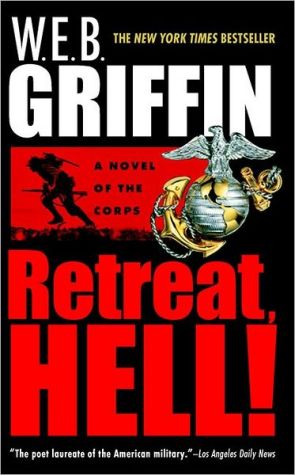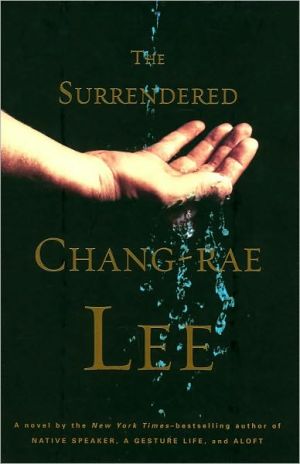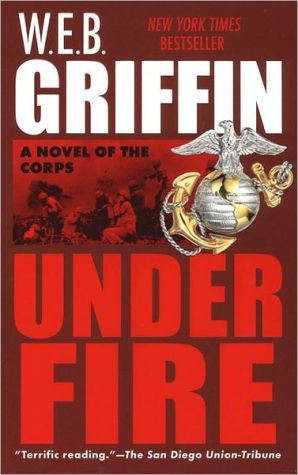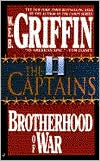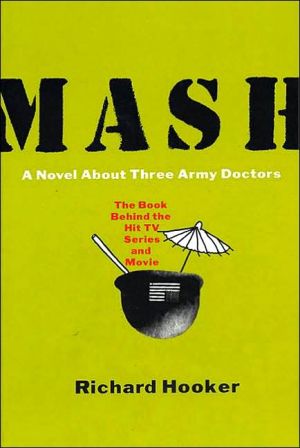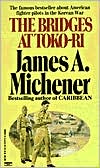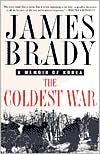Retreat, Hell! (Corps Series #10)
It is the fall of 1950. The Marines have made a pivotal breakthrough at Inchon, but a roller coaster awaits them. While Douglas MacArthur chomps at the bit, intent on surging across the 38th parallel, Brigadier General Fleming Pickering works desperately to mediate the escalating battle between MacArthur and President Harry Truman. And somewhere out there, his own daredevil pilot son, Pick, is lost behind enemy lines—and may be lost forever.
Search in google:
It is the fall of 1950. The Marines have made a pivotal breakthrough at Inchon, but a roller coaster awaits them. While Douglas MacArthur chomps at the bit, intent on surging across the 38th parallel, Brigadier General Fleming Pickering works desperately to mediate the escalating battle between MacArthur and President Harry Truman. And somewhere out there, his own daredevil pilot son, Pick, is lost behind enemy lines—and may be lost forever.Publishers WeeklyMegaseller Griffin (Honor Bound; Brotherhood of War; Men at War) musters another solid entry in his series chronicling the history of the U.S. Marines, now engaged in the Korean War. Gen. Douglas MacArthur, nicknamed El Supremo by his subordinates, is taken by surprise when the North Korean Army surges south across the 38th parallel. After early losses, he rallies his troops and stems the tide, but not for long. Intertwining stories of literally an army of characters reveal how MacArthur and his sycophantic staff overlook the entire Red Chinese Army, which is massed behind the Yalu River and about to enter the war. Brig. Gen. Fleming Pickering attempts to mediate the ongoing battles between feisty, give-'em-hell Harry Truman and the haughty MacArthur, while worrying about his pilot son, Malcolm "Pick" Pickering, who has been shot down behind enemy lines. The introduction of the Sikorsky H-19A helicopter into the war by Maj. Kenneth "Killer" McCoy and sidekick Master Gunner Ernie Zimmerman details the invention of tactics that will become commonplace in Vietnam. Readers looking for guts and glory military action will be disappointed, as barely a shot is fired in anger, but fans of Griffin's work understand that the pleasures are in the construction of a complex, big-picture history of war down to its smallest details: "There were two men in the rear seat, both of them wearing fur-collared zippered leather jackets officially known as Jacket, Flyers, Intermediate Type G-1." Veterans of the series will enjoy finding old comrades caught up in fresh adventures, while new-guy readers can easily enter here and pick up the ongoing story. Author tour. (Jan.) Copyright 2003 Reed Business Information.
[ONE]\ Near Chongju, South Korea\ 0815 28 September 1950\ Major Malcolm S. Pickering, USMCR, whose appearance and physical condition reflected that he had not had a change of clothing-much less the opportunity to bathe with soap or shave-since he had been shot down fifty-eight days before sat between two enormous boulders near the crest of a hill.\ He thought-but was by no means sure-that he was about twenty miles north of Taejon and about thirty miles south of Suwon. Where he hoped he was, was in a remote area of South Korea where there were few North Korean soldiers, lessening the chance that he would be spotted until he could attract the attention of an American airplane, and have someone come and pick him up.\ Those hopes were of course, after fifty-eight days, fading. Immediately after he had been shot down, there had been a flurry of search activity, but when they hadn't found him the activity had slowed down, and-logic forced him to acknowledge-finally ceased.\ He wasn't at all sure that anyone had seen any of the signs he left after the first one, the day after he'd been shot down. What he had done was stamp into the mud of a drained rice paddy with his boots the letters PP and an arrow. No one called him "Malcolm." He was called "Pick" and he knew that all the members of his squadron-and other Marine pilots-would make the connection.\ The arrow's direction was basically meaningless. If the arrow pointed northward, sometimes he went that way. More often than not, he went east, west, or south. He knew that he couldn't move far enough so that he wouldn't be able to see an airplane searching low and slow for him in the area of the sign left in the mud.\ He had left other markers every other-or every third-day since he'd been on the run. The fact that there had been Corsairs flying low over some of the markers-logic forced him to acknowledge-was not proof that they had seen the markers. The Corsairs, when they were not in direct support of the Marines on the ground, went on combined reconnaissance and interdiction flights, which meant that they were flying close to the deck, not that they had seen his markers.\ It was too risky to stay in one place, so he had kept moving. He'd gotten his food-and an A-Frame to carry it in-from South Korean peasant farmers, who were anxious to help him, but made it clear they didn't want anyone to know-either the North Korean military or a local Communist-that they had done so. In either case, they would have been shot.\ He was, of course, discouraged. Logic forced him to acknowledge that sooner or later, he was going to be spotted by North Koreans, or by someone who would report him to the North Koreans. And if they found him, he would be forced to make a decision that was not at all pleasant to think about.\ It wasn't simply a question of becoming a prisoner, although that was an unpleasant prospect in itself. Three times since he had been on the run he had come across bodies-once, more than thirty-of U.S. Army soldiers who, having been captured and after having their hands tied behind them with commo wire, had been summarily executed and left to rot where they had fallen.\ If the North Koreans spotted him, and he could not get away, he was going to die. Not with his hands tied behind his back, but very probably by his own hand, unless he was lucky enough to go down with .45 blazing, à la John Wayne. Logic forced him to acknowledge that was wishful thinking, that he couldn't take the risk of going out in a blaze of glory, that he would have to do it himself.\ Major Pickering's father was Brigadier General Fleming Pickering, USMCR, who was the Deputy Director of the Central Intelligence Agency for Asia. For obvious reasons, young Pickering could not allow himself to fall into North Korean hands.\ It was sort of a moot question anyway. With only five rounds left for the .45, he couldn't put up much of a fight with two North Koreans, much less a platoon of the bastards, or a company.\ The hilltop was bathed in bright morning sunlight, the rays of which had finally warmed Major Pickering-it had been as cold as a witch's teat during the night-but had not yet warmed the ground fog in the valley below enough to burn it off.\ That meant that Major Pickering could not see what he was looking for, even through the 8 ¥ 35 U.S. Navy binoculars he had somewhat whimsically-if, as it turned out, very fortuitously-"borrowed" from the USS Badoeng Strait just before taking off.\ The rice paddy in the valley where he had stamped out the last marker in the mud was covered with ground fog.\ He set the binoculars down and went into the bag tied to the A-Frame. There was what was left of a roasted chicken carcass and the roasted rib cage of a small pig. Surprising Major Pickering not at all, both were rotten to the point where trying to eat any of it would be gross folly.\ After thinking it over carefully, he decided he would bury the rotten meat before breakfast. He dug a small trench with a K-bar knife and did so, and then went back into the A-Frame bag and took from it three balls of cold rice. The smell they gave off was not appealing, but it was not nausea-inducing, and he popped them one at a time into his mouth and forced them down.\ That was the end of rations, which meant that he would have to get some food today. That meant tonight. What he would do was come off the hill, very carefully, and look for some Korean farmer's thatch-roofed stone hut. When he found one, he would keep it under surveillance all day and go to it after dark, entering it with .45 drawn and hoping there would be food offered, and that the farmer would not send someone to report the presence of an American the moment he left.\ So far, food had been offered and North Korean troops had not come looking for him at first light. So far, he had been lucky. Logic forced him to acknowledge that sooner or later everybody's luck changed, most often for the worse.\ When he drank from his canteen-he had two-he drained it, which meant that when he found a Korean farmer's house and more or less threw himself on their mercy, he would have to stick around long enough to boil water to take with him.\ He picked up the binoculars and trained them again on the rice paddy below. The fog had burned off somewhat in the area; he could see the dirt path-it didn't deserve to be called a road-leading to it, but not the rice paddy itself.\ "Oh, shit," he said aloud.\ Two vehicles were just visible on the path.\ They had to be North Koreans. It was entirely possible that these were the first two motorized vehicles ever to move down the path used by ox-drawn carts.\ "I'm losing my fucking mind," he said softly, but aloud.\ The two vehicles were a jeep and a three-quarter-ton weapons carrier. A large American flag was affixed to the tall antenna rising from the rear of the jeep.\ He took the binoculars from his eyes, then squinted his eyes and rolled them around, and then raised them again, hooking the eyepieces under the bone at his eye sockets.\ The jeep and the flag it had been flying . . . Jesus Christ, did I really see an American flag?\ . . . were no longer in sight in the ground fog, but the rear of the weapons carrier was visible.\ There were men holding rifles standing at the back of it, in what looked like U.S. Army uniforms-but he couldn't be sure-\ Jesus, they're gooks! What that is, is a captured weapons carrier, with gooks driving it.\ And they're right at the paddy when I stomped the signal in the mud!\ Jesus Christ, they're looking for me!\ How the hell did they know I was here?\ Well, if I have trouble seeing them with binoculars, they can't see me, and that's a hell of a distance away.\ In what direction did I point the arrow?\ South, I pointed it south! I'm north. Maybe they won't even look this way.\ And maybe they will.\ He took the binoculars from his eyes again and did the eye exercises, and then put the eyepieces back to his eyes.\ Another man was now standing at the back of the weapons carrier, a rifle slung from his shoulder. He was at least a foot taller than the others.\ Jesus, that's a big gook!\ Gook, shit, that's a white man!\ Look again. Don't do anything stupid!\ He exercised his eyes without removing the binoculars from his face.\ When he focused them again there was one more man at the back of the weapons carrier, not quite as tall as the first one but conspicuously larger than the Orientals.\ And white. That's a white man.\ Those are U.S. Army soldiers.\ Or maybe Russians? The Russians would love to grab a downed aviator. And if they are Russians, that would explain the jeep and the weapons carrier.\ Shit, those are Americans! I can tell, somehow, by the way they stand.\ So what do I do now?\ Signal them, obviously. There's no way I can get down this fucking hill in less than thirty minutes. It took me nearly an hour to climb up here.\ I could fire the .45.\ If they could hear it, which I don't think very likely, they won't be able to tell from which direction the sound came.\ If I fire three shots-supposed to be the distress signal-that'll leave me two rounds. And if they can't hear the three shots, they won't be able to recognize the distress signal, and I'm down to two shots.\ The signaling mirror!\ Where the hell is that?\ Jesus, I didn't toss it, lose it, did I?\ A frantic search of the bag on the A-Frame turned up the signaling mirror. It was an oblong of polished metal, maybe three by four inches. There was an X-shaped cut in the center of it, presumably to be used as some sort of aiming device-he had never figured out how that worked-to reflect the rays of the sun, and the dots and dashes of the international Morse code were embossed on one side. He had never figured out how you were supposed to be able to send Morse code with the mirror, either.\ But the basic idea of the mirror, reflecting the rays of the sun to attract someone's attention, seemed simple enough, and he tried to do that. He was quickly able to focus the reflected light on boulders farther down the hill, and, encouraged by that, tried to direct the light all the way down the hill into the valley, to the rear of the weapons carrier.\ He couldn't see the light flashing anywhere in the valley.\ He put the binoculars to his eyes again with his left hand and tried to aim the mirror with his right.\ He couldn't see a flash of light that way either.\ But he saw the two tall guys, the two Americans, vanish from sight, and then the gooks with them . . .\ Who the hell are they?\ . . . crawled into the bed of the weapons carrier.\ And then the weapons carrier backed off the ox path into the edge of the rice paddy. The jeep reappeared . . .\ That is an American flag, goddamn it!\ . . . and headed the other way down the ox path. The weapons carrier followed it.\ In a moment, they were out of sight. Jesus H. Fucking Christ!\ Major Pickering, close to tears, in a frustrated rage, threw the signaling mirror down the hill.\ He lay on his back between the rocks for a full minute, and then heaved himself erect.\ Then he went down the hill and started looking for the mirror.\ —from Retreat, Hell by W.E.B. Griffin, Copyright © 2004 G.P. Putnam's Sons, a member of Penguin Group (USA) Inc., all rights reserved, reprinted with permission from the publisher.
\ Publishers WeeklyMegaseller Griffin (Honor Bound; Brotherhood of War; Men at War) musters another solid entry in his series chronicling the history of the U.S. Marines, now engaged in the Korean War. Gen. Douglas MacArthur, nicknamed El Supremo by his subordinates, is taken by surprise when the North Korean Army surges south across the 38th parallel. After early losses, he rallies his troops and stems the tide, but not for long. Intertwining stories of literally an army of characters reveal how MacArthur and his sycophantic staff overlook the entire Red Chinese Army, which is massed behind the Yalu River and about to enter the war. Brig. Gen. Fleming Pickering attempts to mediate the ongoing battles between feisty, give-'em-hell Harry Truman and the haughty MacArthur, while worrying about his pilot son, Malcolm "Pick" Pickering, who has been shot down behind enemy lines. The introduction of the Sikorsky H-19A helicopter into the war by Maj. Kenneth "Killer" McCoy and sidekick Master Gunner Ernie Zimmerman details the invention of tactics that will become commonplace in Vietnam. Readers looking for guts and glory military action will be disappointed, as barely a shot is fired in anger, but fans of Griffin's work understand that the pleasures are in the construction of a complex, big-picture history of war down to its smallest details: "There were two men in the rear seat, both of them wearing fur-collared zippered leather jackets officially known as Jacket, Flyers, Intermediate Type G-1." Veterans of the series will enjoy finding old comrades caught up in fresh adventures, while new-guy readers can easily enter here and pick up the ongoing story. Author tour. (Jan.) Copyright 2003 Reed Business Information.\ \ \ \ \ Library JournalIn this tenth entry in Griffin's series about the Marine Corps in World War II and Korea (his 30th novel overall), it is fall 1950. McCoy, Pickering, and the others are in the CIA, sniffing out hints that the Chinese Communists will join the war. This puts them at odds with General MacArthur's intelligence people, who feel that such a thing is impossible. Having served in Korea and known many of the players, Griffin has a solid knowledge of the material he presents here. Like his other books, this one is formulaic and predictable, but his many fans will find it hugely entertaining; the Americans are generally so good, so determined, and so skilled that one knows they will win. Still, it should be noted that this book is slower going than its predecessors, as Griffin focuses more on the politics rather than the action of the Korean War. For larger fiction collections. [Previewed in Prepub Alert, LJ 9/1/03.]-Robert Conroy, Warren, MI Copyright 2003 Reed Business Information.\ \ \ Kirkus ReviewsGriffin's 34th blockbuster, tenth in The Corps series (Under Fire, 2002, etc.), which ushered the Marines' X Corps into Korea at that war's start. The present entry ends with the war still in its first year with about three years to go. So, at already a thousand pages, where will this project end? Could be anywhere, since Book VIII (In Danger's Path) left off with the Marines in 1943 while Under Fire leaped ahead to 1950. The same characters are back here, led by Brigadier General Fleming Pickering and his son, Major Malcolm Pickering. At last episode's end, daredevil Malcolm's jet had gone down far behind enemy lines; the new entry picks up with him 58 days on the ground, still trying to get back to friendly territory. Meanwhile, Harry Truman is having big headaches with Douglas MacArthur and fiddles with the idea that he must relieve the Supreme Commander of command. But this quite likely means that MacArthur will retire, run for president as a Republican the following year, and blow Harry out of the catbird seat. With everything now set up, Griffin, who served in Korea, sticks more closely to the action and moves ahead with galvanized self-assurance. Author tour\ \
